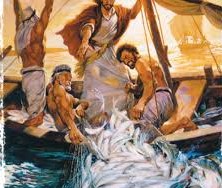Twenty-Sixth Sunday in Ordinary Time
“ .… a great chasm is established to prevent anyone from crossing who might wish to go from your side to ours ….” LK 16:26
“How can justice be achieved?
How can those who refuse to even notice the poorest and weakest continue to live without any remorse or regret whatsoever?
How will they receive just punishment? If they don’t receive it now, then when?”
These are questions that troubled the earliest Christian communities who often witnessed publicly “religious” people who were not kind to other people, never shared, never seemed truly open to the Lord – yet somehow, they appeared to get away with it.
Hence, the questions: “Where’s God’s justice? If it doesn’t happen in this world, will it in the next?”
In an effort to address these questions, Luke offers one of the most famous and dramatic of all Gospel parables – the story of the Rich Man and Lazarus.
From the very beginning of this drama, we can tell how rich this man truly is. His clothing is purple, the color of political power, privilege, and royalty. He wears these emblems of the elite to lavish dinners. Daily, he feasts in this fashion!
He obviously surrounds himself with the political movers and shakers of his time, the wealthiest and the most important. He appears to have everything this world could offer in the way of pleasure and status.
And then … he dies.
Be mindful when reading this parable, that it was written when people had no understanding of what we now call “heaven” and “hell.” Instead, after death, everyone – rich or poor, powerful or weak – ended up in a place called Hades, a place of disembodied existence, often referred to in the Hebrew world as Sheol. This parable also reveals that it was a place in which “a great chasm has been established to prevent anyone from crossing who might wish to go from your side to ours.”
When this Gospel was written, some 70 years after the death of Jesus, the idea of Jesus’ Lordship over the dead had only just begun the slow process of changing the concept of Hades into what we now refer to as “hell.”
Unfortunately, along with that came the notion of eternal torture. The fear of “going to hell” increasingly became paramount in many people’s understanding of why they need to go to church and follow the commandments. Such well-intended, even faith-filled behavior in its most crass form became a kind of “fire insurance policy.”
But, that’s not at all what Luke had in mind in writing this parable.
Rather, Luke was saying that each of us has the potential of replicating the primary sin of the Rich Man: a failure to notice; a refusal to see what is right in front of us; a blind indifference to the radical misfortunes suffered by the great majority of the world.
Luke seemed to believe that we are each a combination of the Rich Man and Lazarus.
Most of us are rich, albeit in varying degrees. As North Americans we could easily see ourselves as the Rich Man. Like him, we have manifold blessings: adequate food and housing and temperature controls; fashionable dress, fine wines.
We might easily be accused by the Lazaruses of this world as being people who don’t notice, don’t see, and don’t respond to the radical poverty and hunger around us. We might easily be pictured as the Rich Man seated at the table of plenty leaving scraps for the less-than’s.
However, Luke also believed that there is a sense of real impoverishment within the great majority of us. As people of conscience, most of us would voluntarily admit to being a Lazarus in terms of our fears and insecurities, our low self-esteem and depressions, our addictions, and our sense of not measuring up to what we want to be. We would readily admit to our lack of spiritual depth, our sins of excess, and our failures at being what we profess to believe.
We’re a mix.
The hope of this gospel story is that we will begin to “see” what we have ignored up to now.
The hope is that we will open our eyes, unlike the Rich Man in the story, and respond to the needs of others in ways we never thought possible.
The further hope is that we will notice, discern, and become increasingly aware – not only of the Lazarus at our door step, but the Lazarus lying hidden within our own hearts – the Lazarus buried within our fears and anxieties; the Lazarus that prevents us from recognizing our own deep impoverishment.
Ultimately this story is about each of us addressing the “chasm” that exists between the “rich” and the “impoverished” part of us, the chasm that prevents us from becoming whole and transformed.
What Jesus wants so intensely is that we will allow God to meet us at the door of our hearts, feed us from his table of mercy, and inspire us to do the same for one another.
That’s when the “chasm” will be healed.
Ted Wolgamot, Psy.D.
11809194.1
9/24/2019


